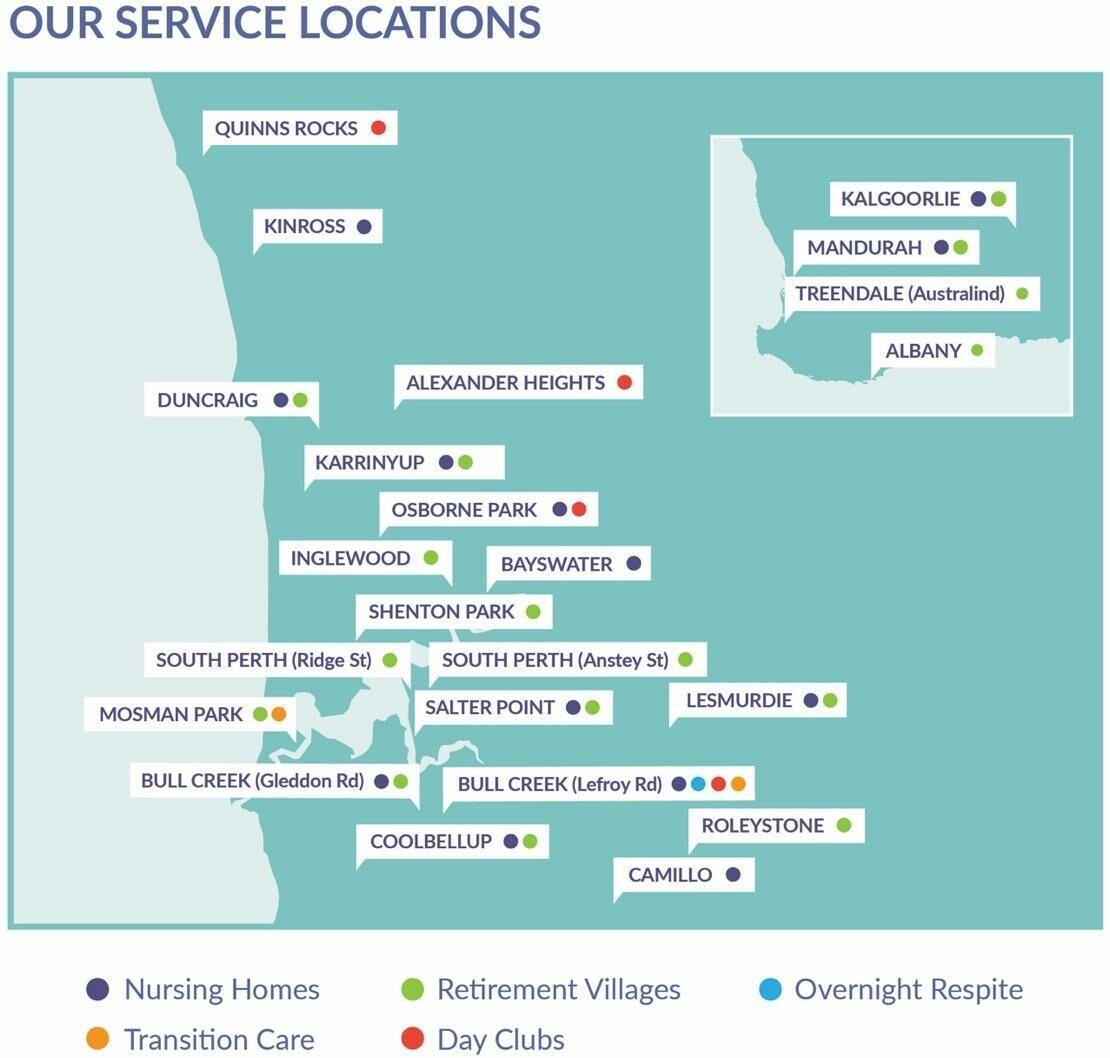Gain crucial experience with on-site placements.
Students have the opportunity to connect with employers during their placement as well as gain the practical skills and knowledge in order to best prepare for the workplace.
On this page.

Work placement gives you the opportunity to apply your knowledge on the job and helps you to understand your career options.
Work placements give you hands-on experience and ongoing support in a real workplace environment. Amana Living and partner organisations generously provide these opportunities, ensuring you are supervised in line with your current training requirements.
The Amana Living Training Institute can organise your placement at any of our 12 aged care centres across Perth and Mandurah. You’ll be assigned a specific role at one of these facilities, gaining valuable insight and opening the door to possible future employment within Amana Living—an edge that sets us apart from other training providers in Western Australia.
Most courses at the Amana Living Training Institute require you to complete a set number of hours in a real workplace and undertake an on-the-job performance review. For example, some Certificate III and IV qualifications include a minimum of 120 hours of work placement, during which your practical skills are assessed.
You’ll need to attend on your scheduled days and keep a record of the hours you complete. Your trainer will check these weekly and report them to our Student Services Team.
Our parent company, Amana Living offers residential care, respite care, transition care and dementia services, across the Perth metro area.
Amana Living is the only major aged care organisation to have its own Registered Training Organisation. This enables Amana Living Training Institute (ALTI) the ability to offer work placements, traineeships and possible employment opportunities for our students. It is an assurance that no other Registered Training Organisation in Western Australia can provide.

What will I do on my work placement?
On your work placement, you will work alongside experienced staff to deliver direct care to residents or clients.
Your tasks will depend on the course you are studying but typically they will include assisting residents and clients with:
personal hygiene such as showering and toileting
getting dressed and grooming
eating and drinking
undertaking social activities
light exercises or walking
medication
How will I be assessed during the work placement?
We will observe you working with a resident/client and assess how you apply the knowledge and skills you have learned in your Development Workshops to the real world.
Prior to your first site visit, we will talk to you about gaining permission from residents/clients and your Manager/Team Leader for us to observe.
Dates and times for site visits will be arranged between you and your trainer for a time that suits you both. As soon as is reasonably possible at the end of an assessment, your trainer will provide you with the result of the assessment.
Feedback will be given on whether you were deemed satisfactory or not yet satisfactory. The feedback will be constructive, and students are encouraged to seek clarification if required.
Can I complete my work placement with an existing employer?
Yes, in some cases our students have been able to complete their work placement with an existing employer. For example, some students are already working at an Amana Living residential care centre in Perth and we have arranged for their work placement to also take place at that centre.
Please speak to the Student Services Team about your work placement options.
How will I find out about my work placement?
The Student Services Team will liaise with students and Service Managers/Team Leaders at Amana Living to arrange a suitable placement. if a placement cannot be found within Amana Living, alternate arrangements will be explored.
What support will I receive on my work placement?
You will have a dedicated manager at the work placement who will be responsible for:
Supporting and encouraging students.
Accommodating rostering to enable students to attend off the job training.
Allowing students to perform tasks outside of their normal roles for assessment purposes.
Providing appropriate feedback on workplace performance in accordance with Amana Living course requirements.
Ensuring the observation process is not interrupted.
Assisting students to access relevant resources in the workplace.
Providing students with feedback on workplace performance.
Reporting problems/needs to the Student Services Team or Training Manager as soon as they arise.
What are the benefits of doing a work placement?
A work placement offers an insight into what working life is like in an aged care or disability care environment.
It’s a great way to put the knowledge gained on your course into practice, building your skills while continuing to learn. This includes transferable skills like problem-solving, team work, time management and communication.
You’ll work alongside trained professionals who will support and mentor you, and you’ll better understand the importance of what you’ve been taught in your lessons.
A work placement can also lead to employment. Many of our students have gone on to work at the Amana Living aged care facility where they have completed their placement.
By the end of your placement, you will have:
Experience of working in an aged care or disability environment.
Worked alongside experienced clinical staff and direct care staff.
Developed and practiced technical skills learnt at ALTI in the workplace.
Been assessed in a real aged care environment working under appropriate. supervision over a set period of hours.
Developed the ability to reflect on your own work practices and growing knowledge and technical base.
